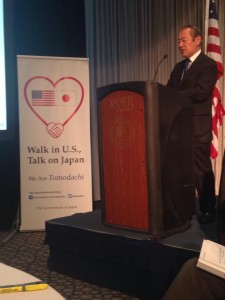Ambassador Fujisaki Comes to Cincinnati
 Tuesday June 3 – Ambassador Fujisaki Comes to Cincinnati
Tuesday June 3 – Ambassador Fujisaki Comes to Cincinnati
The Japan-America Society of Greater Cincinnati recently hosted a delegation from the office of the Prime Minister of Japan, led by former Ambassador Ichiro Fujisaki as part of the Prime Minister’s “Walk in the U.S., Talk on Japan” program, which seeks to deepen the American people’s understanding of Japan by introducing Japan’s strength and attractions through exchanges of views with people in cities across the United States.
The luncheon, hosted at Xavier University’s Cintas Center, featured an impressive roster of speakers and attendees, including former Ambassador Ichiro Fujisaki, the Consul-General of the Consulate of Japan in Detroit, Kazuyuki Katayama, as well as University of Cincinnati President and Honorary Trustee of the Japan-America Society Santa Ono.
After lunch, Ambassador Ichiro Fujisaki led the speakers with his presentation “Changes, Challenges, Chances”, which served as an introduction to the current state of Japanese affairs. Fujisaki addressed the recent Obama’s visit to Tokyo in late April, the focus of which centered on negotiations for the Trans-Pacific Partnership (TPP), a proposed regional trade pact, as well as regional security issues. Fujisaki asserted that significant progress had been made in the TPP negotiations, specifically with regards to beef and pork products. Fujisaki also praised the Obama administration’s commitment to collective-self defense in the Senkaku Islands, and argued for continued U.S. presence in the region. Fujisaki also addressed the state and future of nuclear energy in a post-Fukushima Japan, and briefly described the economic state of affairs under the leadership of Prime Minister Shinzo Abe, who gives name to Japan’s stimulus package, popularly known as “Abenomics.” Fujisaki specifically praised Abenomics’ emphasis on both financial measures and fiscal measures, and identified de-regulation as a key factor of success in the National Strategic Special Zones, which comprise 30% of the national GDP.
Ambassador Fujisaki was followed by Kazutomo Irie, a Senior Research Fellow at the Institute of Energy Economics – Japan (IEEJ) and General Manager of its Asia Pacific Energy Research Center (APERC). Irie’s prior professional background includes the Ministry of International Trade and Industry (re-named the Ministry of Economy, Trade and Industry), where Irie worked on energy policy. Irie’s presentation focused on the dilemma of Japanese energy needs in the wake of the Fukushima nuclear disaster of 2011. In particular, Irie highlighted the heavy reliance on fossil fuels, and the insufficiency of renewable and/or sustainable energy options like wind and solar power in Japan. Irie proposed continued and enhanced cooperation with the United States – specifically expressing a desire for U.S. expertise in designing a safe return to nuclear power and in shale gas. Irie also expressed an interest in reducing Japan’s reliance on Middle-Eastern energy sources and suggested that U.S. natural gas exports might be a key step in adjusting Japanese energy policy.
Yukiko Nakamura followed Irie with her presentation based on her unique experience as a female entrepreneur in Japan. Nakamura is the operator of two successful companies – the first is a translation services company specializing in finance, and the other is a medical service provider. Nakamura highlighted the struggles of female entrepreneurs in Japan, noting that less than 7% of CEOs in Japan were women, which was roughly less than half of those in American corporations. Nakamura proposed structural lending reform, and stressed the need for international internship and mentorship programs focused on women’s professional needs.
The panel discussion then turned to presentations from two college students, Ryosuke Yoneda, a freshman at Kyoto University who discussed the distinct features of the Japanese education system, and Shoto Toda, a freshman at Kwansei Gakuin University who discussed the need for deepened inter-cultural understanding between China and Japan.
The panel discussion was followed by a lively Q&A session with the attendees.
The Greater Cincinnati World Affairs Council would like to thank the Japan-America Society of Greater Cincinnati for bringing this program to Cincinnati.
For more information on events, follow us on Facebook, Twitter, and LinkedIn!
For more information, click the links for the Japan-America Society of Greater Cincinnati, or for the Japanese Consulate in Detroit.


